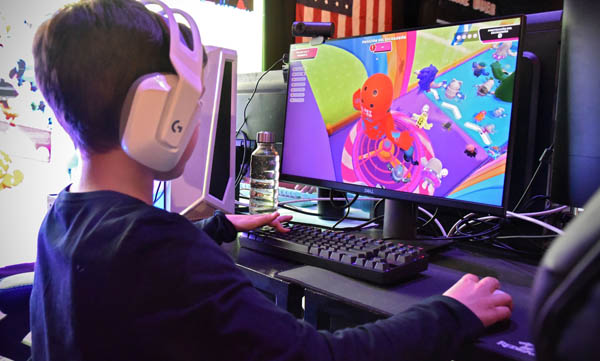Hello, gamers of all ages! Ready to enter an exciting and adventurous digital world?
These interactive experiences not only provide entertainment but also offer numerous benefits for their development. Let’s talk about video games, as they grow up in a world of technology.
Benefits of Computer Games for Kids
Computer games have been shown to have several positive impacts on children’s growth and learning. By engaging with these games, kids can experience:
Improved cognitive skills
Computer games often require players to think critically, make decisions, and solve problems. These activities stimulate their cognitive abilities, including memory, attention, and logical reasoning. Through gameplay, children can sharpen their mental skills enjoyably and interactively.
Enhanced problem-solving abilities
Many computer games present challenges and puzzles that encourage kids to think creatively and devise solutions. By tackling these problems, children develop problem-solving skills and learn to approach challenges from different angles. These problem-solving abilities can translate into real-life scenarios, fostering resourcefulness and adaptability.
Development of social skills
Certain computer games offer multiplayer features, enabling kids to connect and interact with friends or other players worldwide. Engaging in cooperative or competitive gameplay promotes teamwork, communication, and collaboration. These social interactions can enhance children’s interpersonal skills and help them build friendships, even in a digital environment.
Boost in creativity and imagination
Some computer games provide tools for kids to express their creativity and imagination. Whether it’s building virtual worlds, designing characters, or creating artwork, these games foster self-expression and artistic exploration. By engaging in imaginative gameplay, children can unleash their creativity and develop a sense of individuality.
Factors to Consider When Choosing Computer Games for Kids
When selecting computer games for kids, it’s crucial to consider various factors to ensure a positive and enriching gaming experience. Here are some key considerations:
- Age-appropriate content
Different age groups have distinct developmental needs and sensitivities. Selecting games suitable for a child’s age group is crucial to guarantee that what they are learning is both informative and enjoyable. Age ratings and content descriptors can provide valuable guidance when making these choices.
- Educational Value
Many computer games offer educational elements that can complement children’s learning outside of school. These computer games may have a math, science, language arts, or problem-solving component. Selecting games with educational value can help kids reinforce academic skills while having fun.
- Positive messaging
The personality growth of kids can be helped by games that promote good qualities like understanding, teamwork, and respect. Look for games that incorporate moral dilemmas, encourage empathy, and reward positive behavior. These experiences can contribute to shaping children’s values and attitudes.
- Parental controls and safety features
To ensure a safe and controlled gaming environment, it is important to consider games that offer robust parental controls and safety features. These tools allow parents to monitor gameplay, manage screen time, and restrict access to potentially inappropriate content. Prioritizing games with these features can provide peace of mind to parents.
Most Popular Computer Games for Preschoolers:
-
Minecraft
“Minecraft” is a highly popular game that offers endless possibilities for creativity and exploration. In this sandbox-style game, players can build and design their virtual worlds using different materials and tools. It encourages imaginative play and can be enjoyed both individually and in multiplayer mode.
-
LEGO Duplo World
“LEGO Duplo World” combines the beloved LEGO brand with digital gameplay. It allows preschoolers to engage in various activities, such as building structures, solving puzzles, and interacting with friendly characters. This game promotes spatial awareness, problem-solving, and fine motor skills.
-
Toca Life World
“Toca Life World” introduces young children to a virtual universe where they can engage in imaginative play. This game provides numerous locations and characters, allowing kids to create their own narration and explore different aspects of daily life. It encourages storytelling, creativity, and social interactions.
Most Popular Computer Games for Elementary School Kids
-
Roblox
“Roblox” is a widely popular game that offers a vast collection of user-generated content and experiences. It allows kids to participate in virtual events, create their games as well, and interact with other players. “Roblox” fosters creativity, problem-solving, and social connections within a moderated and safe environment.
-
Among Us
“Among Us” is a thrilling multiplayer game that requires players to work together to identify impostors within a spaceship crew. This game promotes strategic thinking, deductive reasoning, and social deduction skills. It offers an exciting and engaging experience for elementary school kids.
-
Animal Crossing: New Horizons
“Animal Crossing: New Horizons” provides a relaxing and immersive virtual world where players can create their island paradise. This game offers activities like fishing, bug-catching, and fossil hunting, encouraging exploration, creativity, and customization. It provides a serene and enjoyable experience for kids.

Most Popular Computer Games for Middle School Kids
-
Fortnite
“Fortnite” is a widely recognized battle royale game that has gained immense popularity among middle school kids. It combines elements of strategy, survival, and building within an online multiplayer environment. “Fortnite” fosters teamwork, quick decision-making, and strategic thinking skills.
-
Minecraft: Education Edition
“Minecraft: Education Edition” leverages the engaging gameplay of “Minecraft” to promote learning in various subjects. It offers educational resources, lesson plans, and collaborative activities for teachers and students. This game encourages creativity, critical thinking, and teamwork while aligning with educational goals.
-
Terraria
A large 2D universe might be viewed and interacted with in the action-adventure game “Terraria”. It combines exploration, fighting, and crafting to give players an exciting experience. “Terraria” promotes creativity, problem-solving, and resource management skills.
Read Also:
1. Online Coding Classes for Kids
2. Robotics for Kids
3. AI Classes for Kids
Most Popular Computer Games for High School Kids
-
Overwatch
A first-person shooter game with a team-based focus called “Overwatch” promotes teamwork and collaboration. A few heroes are chosen by the players, each with specific specialties and playing styles. “Overwatch” requires strategic thinking, communication, and coordination among teammates.
-
League of Legends
The multiplayer online battle arena (MOBA) video game “League of Legends” is highly popular and puts a team of players against one another in battle. It demands teamwork, strategic decision-making, and quick reflexes. For high school students, “League of Legends” offers an exciting and demanding experience.
-
Minecraft Dungeons
A fantastic dungeon crawler game named “Minecraft Dungeons” uses the well-known “Minecraft” universe as its environment. Players embark on quests, battle enemies, and collect valuable loot. It offers an exciting and cooperative gameplay experience, promoting teamwork, problem-solving, and exploration.
Tips for Setting Limits and Ensuring Balanced Gameplay
While computer games can provide valuable experiences, it is essential to establish limits and ensure a balanced approach to gameplay. Here are some tips for parents:
- Establishing time restrictions: Set specific time limits for gaming sessions to ensure that kids have a healthy balance between screen time and other activities.
- Encouraging physical activity and outdoor play: Encourage children to engage in physical activities, sports, and outdoor play to promote a well-rounded lifestyle.
- Monitoring game content and interactions: Stay involved in your child’s gaming experience by monitoring the content they engage with and their interactions with other players.
Conclusion
From enhancing mental abilities and problem-solving abilities to promoting creativity and social interactions, these computer games for kids have a range of benefits. By considering age-appropriate content, educational value, positive messaging, and safety features, parents can choose games that provide a positive and enriching experience for their children. Remember to set limits and encourage a balanced approach to gameplay to ensure a well-rounded childhood.







